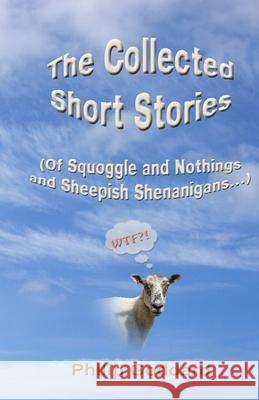The Collected Short Stories: Of Squoggle and Nothings and Sheepish Shenanigans... » książka
The Collected Short Stories: Of Squoggle and Nothings and Sheepish Shenanigans...
ISBN-13: 9781517565640 / Angielski / Miękka / 2015 / 210 str.
From the sublime to the delectably absurd - Enjoy the challenge
Here we have the Author's entire output of short stories - fourteen of them - though excluding a few of what he calls 'poem-stories', which latter will appear in his Collected Poetry volume. They were written from 1981 to 1992.
This collection embraces a considerable diversity - from truly short to novella-length, from intently, purposefully, serious (albeit still with a certain humour) to the most preposterous overtly humorous romps, and from simple narrative to a labyrinthine 'symphonically' organised dream-like creation (enter Nothing, Sweet Nothings )
All the stories were written with the intent of some sort of mental challenge for the reader - even to varying extents in the humorous pieces, and satire often raises its cheeky head, no matter whether the story is supposedly serious or humorous. This particular author has little interest in entertainment without some sort of positive function that goes beyond it, and the stories will be found to repeatedly challenge in all sorts of ways a whole range of habitual outlooks and attitudes among people generally. They will therefore come under fire from some of the people who find themselves discomfortingly challenged by various aspects of the stories' contents.
Find perhaps a friend's, a relative's, or even your very own parental behaviour being shown up starkly for what it is, in A Squoggle Comes Home to Roost. Sit in with Rodney (Nothing, Sweet Nothings) to experience from an unusual viewpoint, laced with black humour, the monumental absurdity of the couch potato's life, forever watching TV and having no notion of there being anything worthwhile for which to live an active life. See some of the absurdities that everyone takes for granted without question in the traditional biblical Christmas story, with a more up-to-date happening of that sort (Madonna with Child). Enjoy the entertaining / disturbing 'what if' scenarios of Tasty Morsels (Danish pastries with other ideas than being eaten), and The Man Who Turned Into a Shoe. For the fireside at Halloween we have a nice little tale (Dark Horse) with a particularly disturbing element. And, quite absurd, one might think, two young 'gay' men having a stay in the guest house of a Benedictine monastery? Probably best to just blush and turn away from that one (A Monastic Weekend), which figuratively raises the frocks of the monks and indeed the whole establishment; what on earth could have been in the Author's mind to write such a piece? What is the world coming to, with authors like this on the loose?: -)
Zawartość książki może nie spełniać oczekiwań – reklamacje nie obejmują treści, która mogła nie być redakcyjnie ani merytorycznie opracowana.











